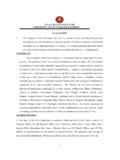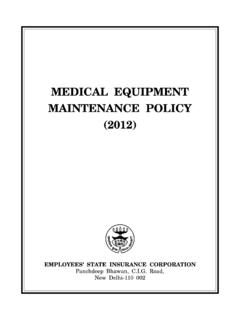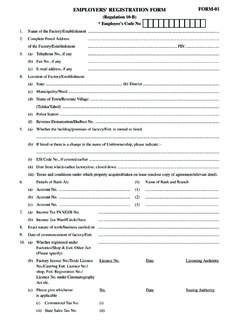Transcription of THE EMPLOYEES’ STATE INSURANCE (CENTRAL) RULES, 1950
1 THE EMPLOYEES STATE INSURANCE (CENTRAL) RULES, 1950 MINISTRY OF LABOUR NOTIFICATION New Delhi, the 22nd June, 1950 212. In exercise of the powers conferred by section 95 of the Employees STATE INSURANCE Act, 1948 (XXXIV of 1948 ), the Central Government is pleased to make the following rules, the same having been previously published as required by sub-section (1) of the said section, namely : RULES CHAPTER I PRELIMINARY 1. Short title and extent. (1) These Rules may be called the Employees STATE INSURANCE (Central) Rules, 1950. (2) They extend to the whole of India. 2. Definitions. In these rules, unless there is anything repugnant in the subject or context, (1) the Act means the Employees STATE INSURANCE Act, 1948 (Act XXXIV of 1948 ) ; (1-A) average daily wages during a contribution period in respect of an employee, means the aggregate amount of wages payable to him during that period divided by the number of days for which such wages were payable.
2 (1-B) Average daily wages during a wage period means (a) in respect of an employee who is employed on time-rate basis, the amount of wage which would have been payable to him for the complete wage period had he worked on all the working days in that wage period, divided by 26 if he is monthly rated, 13 if he is fortnightly rated, 6 if he is weekly rated and 1 if he is daily rated ; (b) in respect of an employee employed on any other basis, the amount of wages earned during the complete wage period in the contribution period divided by the number of days in full or part for which he has worked for wages in that wage period : Provided that where an employee receives wages without working on any day during such wage period, he shall be deemed to have worked for 26, 13, 6 or 1 days or day if the wage period be a month, a fortnight, a week or a day respectively.
3 Explanation. Where any night shift continues beyond midnight, the period of the night shift after midnight shall be counted for reckoning the day worked as part of the day preceding ; (1-C) benefit period means the period not exceeding six consecutive months corresponding to the contribution period, as may be specified in the regulations ; (2) Chairman means the Chairman of the Corporation, the Standing Committee or the Medical Benefit Council, as the case may be ; (2-A) Contribution period means the period not exceeding six consecutive months, as may be specified in the regulations ;] (3) Form means a form appended to these Rules ; (4) the Fund means the Employees STATE INSURANCE Fund ; (5) Government Securities means Government Securities as defined in the Indian Securities Act, 1920 ; (6) immovable property includes land, benefits to arise out of land, things attached to the earth, or permanently fastened to anything attached to the earth ; (7) movable property means property of every description except immovable property ; (7(7-A) standard benefit rate means average daily wages obtained by dividing the total wages paid during the contribution period by the number of days for which these wages were paid.)
4 (8) STATE Medical Commissioner means a duly registered medical practitioner including a medical officer in the service of a STATE Government appointed as such by the Corporation ; (9) year shall mean the financial year, that is to say, the period beginning from the first of April and ending with the thirty-first of March of the year following. (10) all other words and expressions shall have the meanings respectively assigned to them in the Act. CHAPTER II 2-A. Election of members of Parliament to the Corporation. The House of the People (Lok Sabha) and the Council of States (Rajya Sabha) shall elect in such manner as the Speaker of the House of the People or as the case may be the Chairman of the Council of States may direct, two members of the House of the People (Lok Sabha) and one member of the Council of States (Rajya Sabha) to be members of the Corporation.
5 3. Election of members to the Standing Committee. (1) The Chairman of the meeting shall, at a meeting of the Corporation at which it is proposed to elect members of the Standing Committee under clause (c) of section 8, invite members to propose names from among members of the Corporation belonging to the group from which election is to be made. The names proposed shall be duly seconded by another member of the Corporation. (2) If the number proposed from any group for election does not exceed the number of vacancies to be filled from that group, the persons whose names have been so proposed shall be declared elected to the Standing Committee. (3) If the number proposed for election from a group exceeds the number of vacancies to be filled therefrom, each member of the Corporation present at the meeting shall be given a ballot paper containing the names of all the candidates proposed and he shall be required to vote thereon for as many candidates from the group as there are vacancies to be filled up.
6 Not more than one vote shall be given in favour of any one candidate. If any member votes for more candidates than there are vacancies in the group or gives more than one vote in favour of any one candidate, all his votes shall be deemed to be invalid. (4) The persons getting the highest number of votes shall be declared by the Chairman at the meeting or as soon thereafter as possible as duly elected to the Standing Committee : Provided that where an equality of votes is found to exist between any candidates and the addition of one vote will entitle any of the candidates to be declared to be elected, the determination of the person or persons to whom such one additional vote shall be deemed to have been given shall be made by lot to be drawn in the presence of the Chairman and in such manner as he may determine.
7 (5) If any question shall arise as to the validity of any election it shall be referred to the Central Government whose decision in the matter shall be final. 4. Restoration to membership. (1) A member of the Corporation, the Standing Committee or the Medical Benefit Council, who ceases to be a member by virtue of section 12, shall be informed of such cessation by a letter sent to him by registered post. The letter shall also indicate that if he desires restoration to membership, he may apply therefor within thirty days from the receipt of the letter. (2) The application under sub-rule (1) shall indicate the reasons which prevented him from attending three consecutive meetings and shall be addressed to the Chairman concerned.
8 (3) The application shall be placed before the next meeting of the Corporation, the Standing Committee or the Medical Benefit Council, as the case may be, and if a majority of the members present at such meeting are satisfied that the reasons for failure to attend three consecutive meetings are adequate, he shall be restored to membership immediately after a resolution to that effect is adopted. (4) The benefit of restoration to membership as provided for in this rule shall be allowed to a member only once during any one term as a member. 5. Fees and allowances of members. (1) Subject to the provisions of sub-rules (2) and (3), every non-official member of the Corporation, Standing Committee or the Medical Benefit Council shall be allowed travelling and daily allowance for attending the meetings of the Corporation or the Standing Committee or the Medical Benefit Council, as the case may be, at the following rates : (i) Travelling Allowance : (A) A non-official member residing at the place where a meeting is held shall be allowed the actual expenditure incurred by him on conveyance subject to the maximum of rupees one hundred and fifty for each day for travel within the city.
9 (B) a non-official member, not residing at the place where a meeting is held, shall be allowed to draw : (a) actual expenditure incurred by him on air journey by economy class ; or (b) actual expenditure incurred by him on journey by rail by 2nd class , two tier sleeper or First Class, as the case may be ; (c) actual fare or expenditure incurred on road journey by taxi or own car or autorickshaw or bus (other than an air conditioned bus) but not exceeding the rates notified by the concerned Director of Transport for journey by taxi or autorickshaw. When the journey is performed between places connected by railway, mileage would be limited to what would have been admissible to the member under clause (b) of this item.
10 (ii) Daily allowance : (A) A non-official member residing at a place where a meeting is held shall not be entitled to any daily allowance ; (B) A non-official member, not residing at the place where a meeting is held shall be paid, Rs. 1500 per day if member stays in a hotel and, not exceeding Rs. 200 per day as expenses towards food : Provided that the daily allowances shall be calculated for the entire absence from the normal place of residence of the non-official member on calendar day basis, , midnight to midnight as under : For absence not exceeding 6 hours Nil For absence exceeding 6 hours but not exceeding 12 hours 70% For absence exceeding 12 hours 100%. (2) A non-official member of the Corporation or Standing Committee or the Medical Benefit Council who is a Member of Parliament or a Member of STATE Legislature shall be paid travelling allowance and daily allowance in accordance with the provisions of the Salary, Allowances and Pension of Members of Parliament Act, 1954 (30 of 1954) or the respective provision of the law pertaining to the members of the concerned STATE Legislature.











